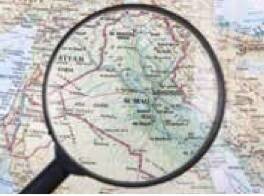The Treaty of Westphalia, signed in 1648, signaled the beginning of the end of more than a century of conflict between Europe’s Catholics and Protestants. While it did not create a complete peace, much less produce broad religious harmony, it at least began an accommodation that allowed Europe’s Christians—and the nation-states that emerged from the treaty—to coexist more or less without open conflict.
The world awaits a gathering of the Sunni and Shiite branches of the Islamic world that may someday similarly lead, if not to total peace, then at a minimum to a period of reduced conflict. That would offer breathing room for dialogue that could lead to long-term rapprochement. In the meantime, these Islamic communities continue a historic collision that heedlessly devours combatant and noncombatant alike in Iraq, Syria and Lebanon. Exploding cars and human bombs steal lives on the streets of Baghdad. Terrified, trembling children emerge from among the dust clouds and broken cinder blocks of homes devastated by air strikes in Aleppo. Some means of establishing a circuit breaker for the region’s accelerating cycle of sectarian violence has to be found.
One such breaker may be to hold up a model of democratic governance and multicultural tolerance. The region most likely to provide that example today is the Kurd-administered provinces of northern Iraq. The Kurdistan Regional Government has functioned as a more or less independent state since the U.S. invasion of Iraq in 2003 (or, arguably, since the creation of the Iraq no-fly zone in 1991). The regional government brokers its own oil deals with multinational corporations, invests in regional infrastructure, maintains an independent defense force and protects its borders with Syria and its confederated regions in southern Iraq. Full independence for Kurdistan has long been considered an impossible dream because of opposition from Turkey, a nation with a large and restive Kurdish minority of its own. But in recent years, Turkey has been one of the largest political and economic collaborators with Northern Iraq/Kurdistan, a mutually beneficial arrangement that has diminished Turkish resistance to the evolution of northern Iraq from de facto to de jure nationhood.
An independent Kurdistan would face many obstacles, many of them self-imposed. Political cronyism, petty corruption and discrimination against other minorities within northern Iraq are already a problem. The legitimacy of nationalistic claims on oil-rich southern regions of a presumed Kurdistan, particularly around the contested city of Kirkuk, would remain to be resolved.
Iraq’s Kurds have good reason to distrust the intentions of the United States. Historically, American enthusiasm for Kurdish independence has been only as reliable as the prevailing U.S. strategic interest. But just now in Kurdistan the United States is enjoying wide acclaim, perceived as a liberator from the hated Saddam Hussein. The United States should seize the opportunity to help nurture Kurdistan statehood. Under benevolent U.S. guidance or at the sharp point of aid-dangling U.S. insistence, Kurds could develop political institutions that would demonstrate what a pluralistic Middle Eastern society might look like. A peaceful and tolerant Kurdistan could offer an oasis of security for the vulnerable Christians of the region.
An outbreak of micro-states in the region based on cultural and religious distinctiveness is surely not the best of all possible political outcomes, but it would certainly be preferable to the vicious, pointless brutality that currently reigns, especially as the violence seems likely to spread elsewhere soon unless there is some dramatic change.
The United States carries a heavy responsibility for unleashing the maelstrom of sectarian conflict that now threatens the entire region. It must therefore assume the heaviest burden for diminishing it. It must maintain a patient, persistent diplomacy and devote its vast capabilities to humanitarian relief for the victims of conflict. And while the world waits in hope for the combatants in Syria to come to their senses, the other international players in this drama could contribute, as Pope Francis regularly implores, by halting the flow of arms. They could begin this disengagement by forswearing further arms shipments until indiscriminate attacks on civilian areas by either side are halted.
Kurdish independence is already a reality on the ground in northern Iraq; it is reasonable for it to become a reality on the world map. Beyond its importance as a regional laboratory of self-directed nation-building, the creation of an independent Kurdistan responds to a simple demand of justice and a long-recognized and revered right to self-determination. Suppressed by Ottoman, Persian and Arab alike, betrayed by “allies,” brutalized and gassed by dictators, it is hard to imagine another people who have as legitimate a moral and geopolitical claim on nationhood than the long-suffering, somehow still unvanquished Kurds.








